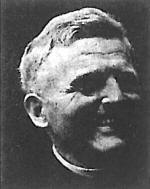
He said, she said, they said
Sometimes I like to lull myself to sleep at night by reading obscure books about Biblical Greek. I recently picked up a real snore-fest by Maximilian Zerwick called Biblical Greek: Illustrated Examples. Early in the book Zerwick talks about a phenomenon in Greek, which also exists in English, in which the third person plural refers to some general, anonymous group, usually best translated as “they say” or “people say.”
In German and French, there’s a singular form (“man sagt” and “on dit“), but in English we have the same sort of thing as in Greek. For example:
They say a little knowledge is a dangerous thing, but it’s not one half so bad as a lot of ignorance. –Terry Pratchett (Equal Rites, emphasis mine)
As Zerwick rightly points out, we usually see the indefinite plural with verbs of telling, hence in Latin: “dicunt, ferunt, tradunt.” It’s possible that indefinite plurals were common in Aramaic, which Zerwick suggests may have influenced Mark. He writes:
This is perhaps why it occurs with especial frequency in Mk, often, in parallel passages, corrected by Mt, and still oftener by Lk. . . . [I]n Mk (3,21) we read a text which seems offensive to the honour of the Mother of God: ἀκούσαντες οἱ παρ’ αὐτοῦ ἐξῆλθον κρατῆσαι αὐτόν, ἔλεγον γὰρ ὅτι ἐξέστη [akousntes hoi par’ autou exēlthon kratēsai auton, elegon gar hoti exestē]. These παρ’ αὐτοῦ [par’ autou] are later (v. 31) said to be “His mother and his brethren.” Were they necessarily the ones who thought Jesus was deranged? (Zerwick, 2011, p. 2)
In most English translations, the meaning seems to be that Mary and Jesus’ brothers thought he had come unhinged.
And when his family heard it, they went out to seize him, for they were saying, “He is out of his mind.” (Mark 3:21, ESV)
“His family heard” . . . “they went out” . . . “they were saying.” Simple, right? Continue reading “Did Jesus’ Mother and Brothers Lose Faith in Jesus?”
